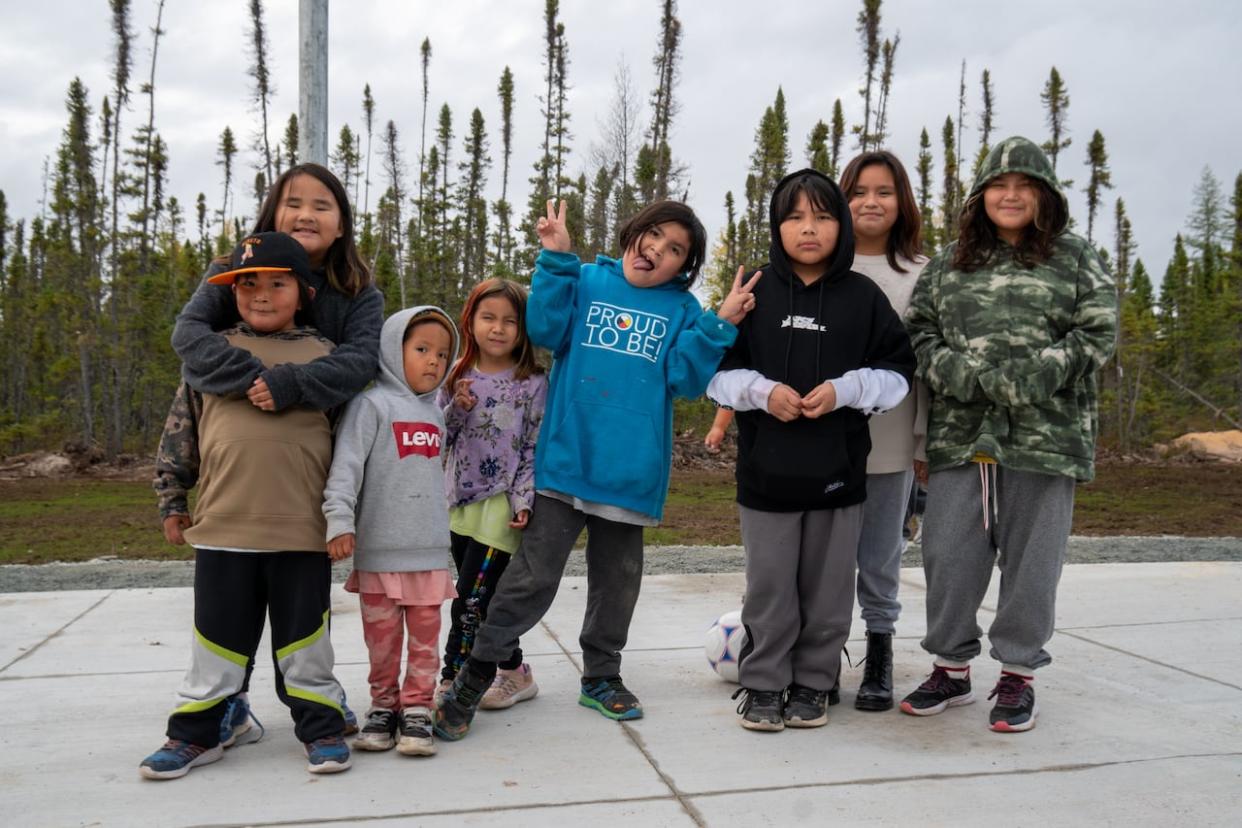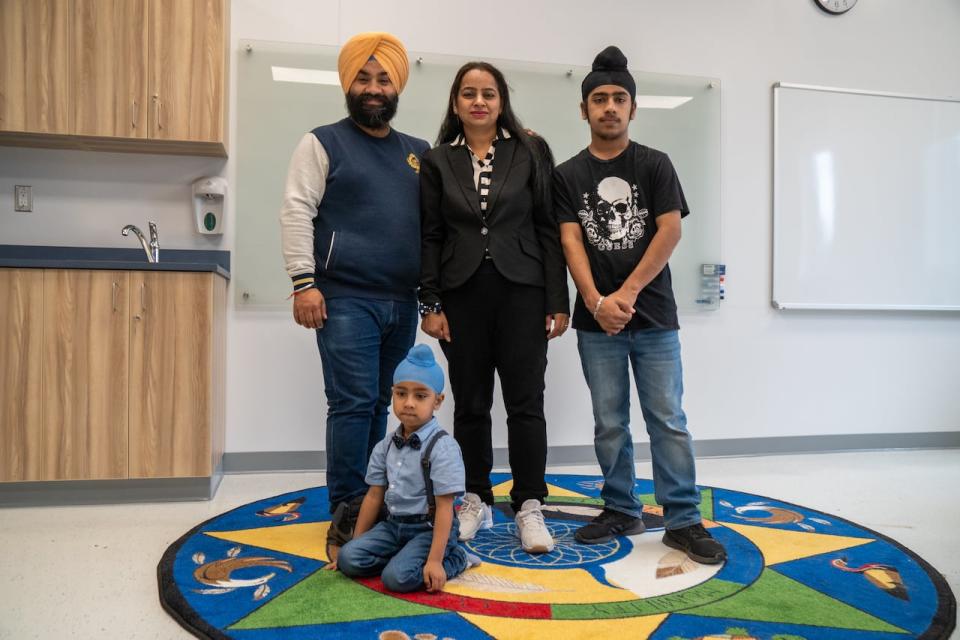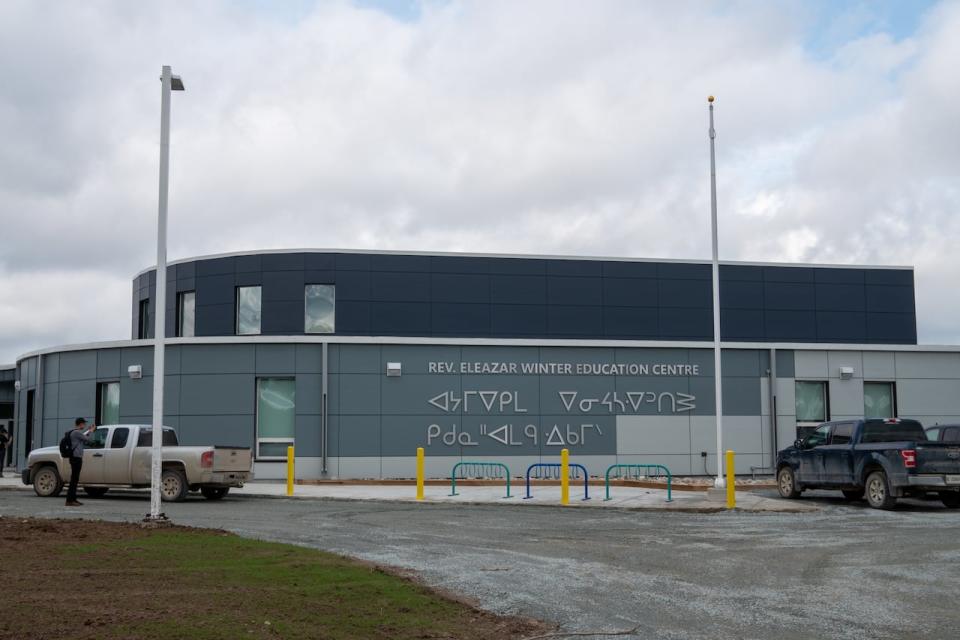Now that Wapekeka First Nation has a new school, it's time to figure out how to get more students in class

WARNING: This story contains references to youth suicide.
Another remote First Nation in northern Ontario is celebrating the opening of a new school.
Wapekeka First Nation, about 450 kilometres northeast of Sioux Lookout, is home to about 500 Oji-Cree people. The community's former school, Rev. Eleazar Winter Memorial, burned down in May 2015. A temporary school opened in 2016.
"It was very hard when our school burned down. A lot of hearts were broken. A lot of memories were crushed," said education director Ronald Brown.
Construction on the new school was delayed due to the COVID-19 pandemic, but on Friday, the community came together to cut the ribbon for Rev. Eleazar Winter Education Centre.
The school will have 120 to 140 students from junior kindergarten (K4) to Grade 8. Band manager Joshua Frogg said the community can usually accommodate its Grade 9 and 10 students before they finish high school in Sioux Lookout or Thunder Bay, but a teacher shortage has meant 14 and 15-year-olds had to move out early.
The $39.5-million project, sponsored by Indigenous Services Canada, is among other new schools in the region, including in:
Kingfisher Lake First Nation, where a school is set to open in early October.
"I feel very happy inside," said Wapekeka's Chief Brennan Sainnawap. "It's been a long time coming, a lot of setbacks, but we didn't give up."
Bringing students back
Rupinder Kaur Jabbal and her family moved to Brampton, Ont., from India in 2019. Having worked in remote communities before, she seized the opportunity to teach in Wapekeka, where she could secure a permanent position instead of being a supply teacher in the Greater Toronto Area. Her husband has been hired as a medication clerk and community health representative in Wapekeka.
While her youngest son can attend kindergarten in the community, her eldest has been put on a waitlist to learn online through the Peel District School Board due to a shortage of high school teachers in Wapekeka.
Kaur Jabbal said everyone has been kind and supportive, though she is concerned with what she's heard about students' low attendance.

Rupinder Kaur Jabbal, centre, and her family have settled in Wapekeka First Nation, where Jabbal has taken a teaching job and her husband has been employed at the community pharmacy. (Sarah Law/CBC)
Georgina Winter, the school's vice principal and one of its teachers, will have 28 students in Grade 5/6 this year, though she describes her class as consisting of multi-learning levels ranging from kindergarten to Grade 5. Attendance has dropped significantly since the COVID-19 pandemic, resulting in many students falling behind.
Up to half the school's students require special education services. Winter said the community hasn't had a special education teacher since the pandemic began early in 2020, though there are class helpers who provide extra assistance.
"We've tried lots of incentives for them to come to school, but still it's kind of hard to get them to participate in school," Winter said. "I'm hoping with this new school that we have, we have more students coming to school because we have a lot of the facilities that they could be using."

Young artists in Wapekeka First Nation break in the whiteboard markers at Rev. Eleazar Winter Education Centre. (Sarah Law/CBC)
Those facilities include a kitchen, gymnasium, playground, hockey rink and sports fields — thanks to community lobbying for federal government funding.
At the temporary school, students had to walk outside to get from class to the community's gym, Winter said.
"Here they could just go within the building," she said. "We don't have to worry about them getting cold."
Still, there are challenges ahead.
Winter said the new school's classrooms are small, and as of Friday, she was short 10 desks for her room. Teachers will have to get creative to find storage space as staff finish moving supplies into the building in time for classes to start next week, she said.

Georgina Winter is vice-principal and a teacher at Rev. Eleazar Winter Education Centre. She hopes the new school will mean boosted attendance; since the COVID-19 pandemic, fewer students have been coming to class. (Sarah Law/CBC)
There's also the issue of transportation. Winter said the former school was located in the centre of the community within walking distance, whereas students will have to catch the bus to get to the new school.
"From where I live, it's like an eight-minute walk, and for them, it could be [a] 20-minute walk if they live way across town."
If the school bus driver is sick or students miss the bus, "attendance won't be so good."
Hopes for the next generation
Wapekeka's students gave CBC News positive reviews of the playground, which is where most of the children were during the grand opening ceremony.
"It's more big than the old school and I like it," said one student. "I can't believe that there's a playground here."
There were some critiques of the height of the monkey bars and basketball nets — they are too tall — though the students may grow into their new equipment.
Several students said they didn't go to school every day, but would go more often if their friends went there.
Community member Precious Cutfeet, 20, said she'd like to see more youth supporting each other to achieve their goals.

Rev. Eleazar Winter Education Centre has replaced Wapekeka First Nation's former school, which burned down in May 2015. (Sarah Law/CBC)
Cutfeet lost her best friend and sister to suicide, and is a survivor herself. Now, "life is good," she said, and she's expecting a baby boy this November.
"Where was the school when I was their age?" she said, laughing. "But I'm glad that the community decided to provide them a new school, a new environment to be in to enjoy learning and exploring."
She left school at age 13 due to bullying. When dealing with her own mental health challenges, Cutfeet said, volleyball was a great coping mechanism. She plans to attend games at the new school gym and looks forward to when her son can attend.
Despite challenges with school attendance, Cutfeet said she's hopeful about Wapekeka's next generation.
"We wouldn't even talk about our feelings, and I'm surprised this generation does. [It] makes me happy," she said.
"I just hope they find someone else to talk to," she continued. "Being in that hole, that deep dark hole, it's very hard to get out of, especially when you're doing it by yourself. You need people around you."
Next year, Cutfeet plans to return to school to study math, English and science, and eventually get her high school diploma.
The Kids Help Phone can be reached 24-7 at 1-800-668-6868. Talk Suicide Canada can be reached 24-7 at 1-833-456-4566.


